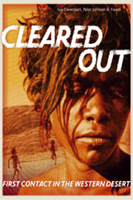Cleared Out: First contact in the Western Desert
Summary
In 1964, a group of 20 Aboriginal women and children in the Western Desert made their first contact with European Australians — patrol officers from the Woomera Rocket Range, clearing an area into which rockets were to be fired. They had been pursued by the patrol officers for several weeks, running from this frightening new force in the desert.
Yuwali, 17 at the time, remembers every detail of the drama – first seeing these ‘devils’ and their ‘rocks that moved’, escaping the strange intruders. Her sharp recollections are complemented in a 3-part diary of the ‘chase’ by the colourful official reports of the patrol. These reflect a similar drama – arguments within Government about the treatment of desert inhabitants and public scepticism about the Government’s intent. Line-drawn maps and black & white illustrations complement the text.
Yuwali’s story also resonates in today’s debate about the future of many Indigenous desert communities. Cleared Out combines three oral histories, detailed archival research and a wealth of photographs and rare film footage from the patrol. Through one extraordinary episode, the multiple perspectives on the moment of contact are revealed.
Awards
Winner — WA Premier's Book Awards, 2005
Winner — WA Premier's History Awards, 2005
Winner — Stanner Award, 2006
Reviews and endorsements
Hence, for the authors of Cleared Out, the need for an ‘honourable dialogue’ in which the dominant society discards its sense of social and cultural sovereignty. Their meticulously compiled and presented book is as much policy analysis as desert adventure tale; it builds to this urgent closing note, much like the rising façade of a cathedral.
- Nicolas Rothwell, The Weekend Australian, November 2005
Try to image, for a minute, the scene. You’re 17 and the 20th century has just come rolling into your world, the Great Sandy Desert of Western Australia. Metal does not exist; your tools are made of wood or stone. You have never eaten wheat flour, drunk tea or tasted sugar. You have never seen a white person. Everything is about to change…For decades Yuwali did not return to the Percival Lakes. When she did, in 1999, she found her grinding stone, just where she left it.
- Andrew Stevenson, News Review, Sydney Morning Herald, November 2005
This book has many things going for it - the superb maps and pictures, the clarity of narrative and the admirable restraint in apportioning blame or making moral judgements. If anyone wants to know about how misunderstandings arose from the first moments of contact between white Australians and Aborigines throughout our shared history, then begin with this wonderful book.
- Louis Nowra, Review of the Week, Sydney Morning Herald, January 2006
This is an immensely powerful text in its message of the ‘endless re-enactment’ of Yuwali’s story, as policy makers continue to ‘chase about, seeking to improve Martu lives, driven by a mix of politics, guilt, good intentions and concern about public perceptions, without fully recognizing the need for policy and actions’ that resonate with Martu reality.
- Sarah Holcombe, The Australian Journal of Political Science, November 2007
Media release (PDF 60 KB)
